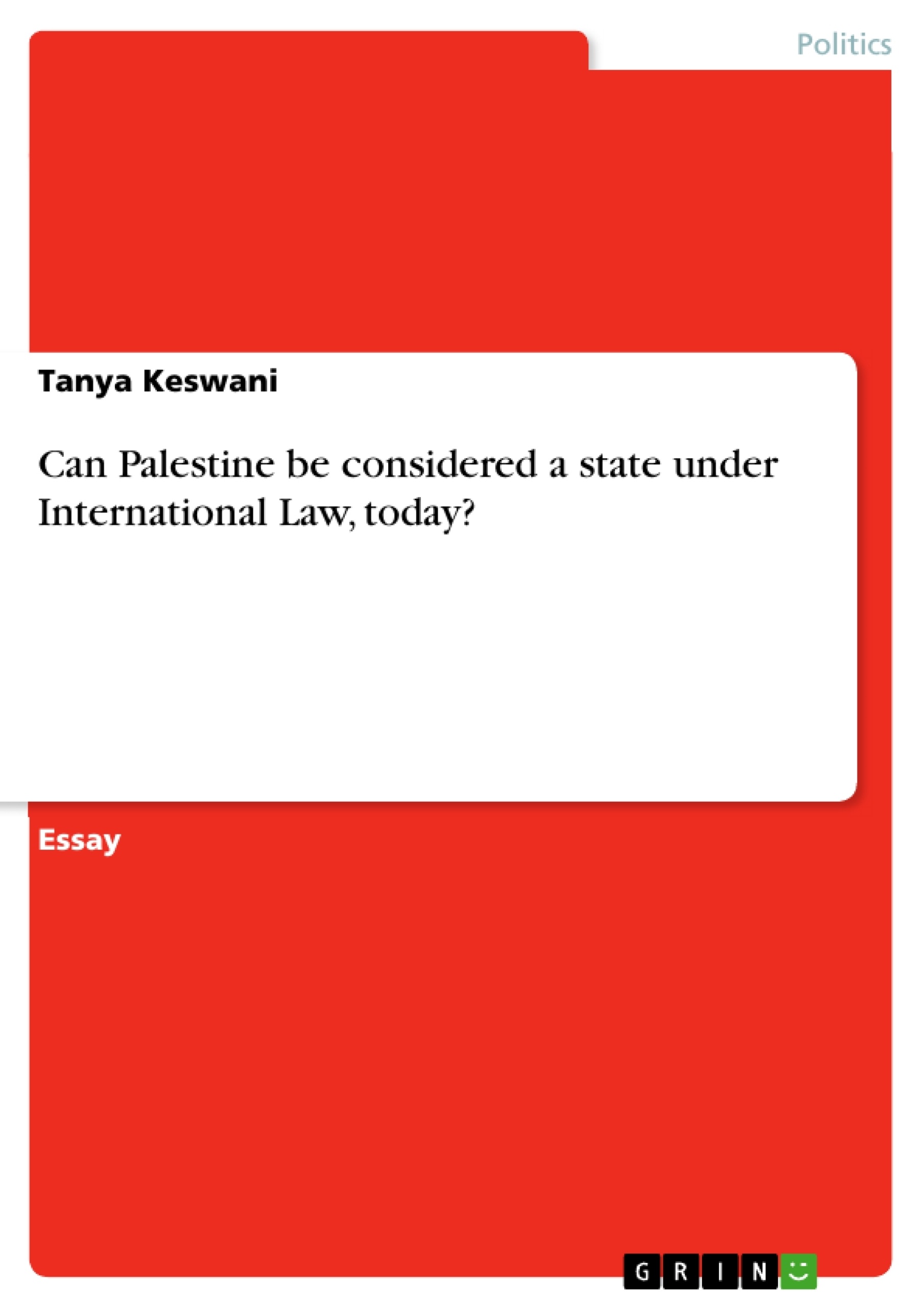This paper critically assesses whether Palestine is a state under International Law today. It observes the extent to which Palestine meets the traditional criteria of statehood set out in the 1933 Montevideo Convention on Rights and Duties of States.
In order to determine whether Palestine is a state we must first identify what makes a ‘state’ under international law (IL). The Montevideo Convention on Right and Duties of States (MC) 1933 sets out the traditional criteria for statehood. Apart from the four conditions set out in Article 1, Article 3 and 6 on recognition are equally significant. Palestine statehood is in question because MC has “no mention of putatively relevant matters such as independence, legitimacy, democracy or self-determination”. These post-1933 concepts apply to state practice over time, and need to be taken into consideration when assessing Palestine’s statehood today. The first two conditions of MC have mostly remained the same. The latter two, when applied to state practice, alter the criteria for a ‘state’ under IL. This paper will observe to what extent Palestine meets the MC criteria, and how it has altered post-1933. The last condition with reference to Article 3 brings into question the current role recognition plays towards the legality of a state.
Inhaltsverzeichnis (Table of Contents)
- Introduction
- I Population and Territory
- Permanent Population
- Territory
- II Government, Self-Determination and Independence
- Effective and Exclusive Government
- Self-Determination and Independence
- III Capacity to enter into relations with other states and Recognition of a state
- Capacity to enter into relations with other states
- Recognition of a state
Zielsetzung und Themenschwerpunkte (Objectives and Key Themes)
This paper examines the statehood of Palestine under international law (IL) by analyzing its adherence to the criteria established by the Montevideo Convention on Right and Duties of States (MC) and subsequent developments. The paper investigates how the criteria for statehood have evolved since 1933 and particularly analyzes the significance of self-determination in relation to the criteria for government. The paper explores the role of recognition by the international community in determining statehood.- Statehood criteria under international law
- The role of the Montevideo Convention on Right and Duties of States
- The impact of self-determination on statehood criteria
- The role of recognition by the international community in determining statehood
- The specific case of Palestine's statehood
Zusammenfassung der Kapitel (Chapter Summaries)
Introduction
The introduction outlines the paper's objective, which is to critically assess the claim that Palestine is a state under international law. It establishes the framework for the analysis by referring to the Montevideo Convention on Right and Duties of States (MC) and its four criteria for statehood. The introduction also highlights the significance of post-1933 developments in state practice, including the concepts of self-determination and recognition, which will be considered in the analysis.I Population and Territory
This chapter examines the first two criteria for statehood under the MC: permanent population and defined territory. It explores how these criteria have been interpreted and applied in practice, with examples from Nauru, the Vatican City, and the Western Sahara case. The chapter argues that Palestine meets both criteria based on its historical inhabitants and its declared territory.II Government, Self-Determination and Independence
This chapter examines the third criterion for statehood under the MC: government with effective and exclusive control over its people and territory. It analyzes how this criterion has evolved with the principle of self-determination and how this principle has influenced the concept of "government" in the context of decolonization. The chapter argues that while Palestine's government might not fully meet the traditional criterion of "effectiveness and exclusiveness," its right to self-determination significantly mitigates this deficiency.III Capacity to enter into relations with other states and Recognition of a state
This chapter examines the fourth and final criterion for statehood under the MC: capacity to enter into relations with other states. It discusses how the development of the UN and other international organizations has transformed the meaning of "relations with other states," and how collective recognition by the international community plays a significant role in determining statehood. The chapter argues that Palestine sits on the fence in terms of this criterion due to its recognition by some international organizations but its lack of full membership in the UN. It concludes that the current lack of recognition from certain states, such as the US and Israel, ultimately prevents Palestine from fully meeting the fourth criterion for statehood.Schlüsselwörter (Keywords)
The main keywords and focus topics of this paper include statehood, international law, Montevideo Convention, self-determination, recognition, Palestine, Israel, UN, international organizations, effective government, territory, population, capacity to enter into relations with other states.- Quote paper
- Tanya Keswani (Author), 2019, Can Palestine be considered a state under International Law, today?, Munich, GRIN Verlag, https://www.grin.com/document/535087




